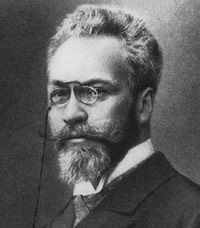
Oskar Minkowksi is known for his discovery of pancreatic diabetes He was nominated for the Nobel Prize six times during his career.
Minkowski studied at the University of Konigsberg before becoming a professor in Strasburg in 1888.
Later that year, Minkowski discovered a library journal in which Joseph von Mering asserted that pancreatic enzymes were required to break down fatty acids in the gut.
According to physiologist Claude Bernard, pancreatectomy – which would be the best way of establishing this assertion – would be impossible, but Minkowski proceeded to conduct the procedure in dogs.
Von Mering acted as Minkowski’s assistant for the procedure, and after Minkowski made the connection between polyuria and diabetes, he tested the urine of the animals for glucose.
The high glucose levels marked the discovery of pancreatic diabetes.
Minkowski later went on to chair the German Association of Internal Medicine and became one of Europe’s leading diabetologists. Since 1966, the Minkowski Prize for outstanding contribution to the advancement of knowledge in the field of diabetes mellitus has been awarded by the European Association for the Study of Diabetes.




